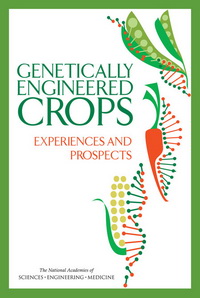
U.S. National Academies Find Biotech Crops Not Harmful to Human Health and the Environment
May 18, 2016| |
 Genetically engineered (GE) crops and conventionally bred crops have no difference in terms of causing risks to human health and the environment, according to the report Genetically Engineered Crops: Experiences and Prospects released by the National Academies of Sciences, Engineering, and Medicine.
Genetically engineered (GE) crops and conventionally bred crops have no difference in terms of causing risks to human health and the environment, according to the report Genetically Engineered Crops: Experiences and Prospects released by the National Academies of Sciences, Engineering, and Medicine.
The report is based on the results of an extensive study that was conducted by over 50 scientists for two years. The study includes data from 900 researches on biotech crops since it was commercialized in 1996.
The key points of the report include:
- Studies with animals and research on the chemical composition of GE foods currently on the market reveal no differences that would implicate a higher risk to human health and safety than from eating their non-GE counterparts.
- The use of insect resistant or herbicide tolerant crops did not reduce the overall diversity of plant and insect life on farms, and sometimes insect resistant crops resulted in increased insect diversity.
- Commercially available biotech crops had favorable economic outcomes for farmers who adopted these crops.
- Insect resistant crops have had benefits to human health by reducing insecticide poisonings.
- Several GE crops are in development that are designed to benefit human health, such as rice with increased beta-carotene content to help prevent blindness and death caused by vitamin A deficiencies in some developing nations.
The research committee established a website to enable the general public to know more details of the report and submit comments about the results.
The research was funded by Burroughs Wellcome Fund, the Gordon and Betty Moore Foundation, the New Venture Fund, and the U.S. Department of Agriculture, with additional support from the National Academy of Sciences.
Read the news release from National Academies of Sciences, Engineering and Medicine.
| |
Biotech Updates is a weekly newsletter of ISAAA, a not-for-profit organization. It is distributed for free to over 22,000 subscribers worldwide to inform them about the key developments in biosciences, especially in biotechnology. Your support will help us in our mission to feed the world with knowledge. You can help by donating as little as $10.
-
See more articles:
-
News from Around the World
- U.S. National Academies Find Biotech Crops Not Harmful to Human Health and the Environment
- Glyphosate Unlikely Carcinogenic to Humans, Says Joint WHO/FAO Committee Report
- Cairo University Celebrates Biotech Day 2016
- FSU-Cornell Research Team Discovers 'Dark Matter' in Maize Genome
- Newly Discovered Stem Cell Pathway Will Increase Yields of Maize and Staple Crops
- Parliamentary Report Confirms Importance of Agricultural Innovation in Australia
- Bt Cotton Adoption Creates More Employment Opportunities in Female Laborers in Pakistan
- Chinese Scientists Evaluate Performance of Plant Gene as a Selectable Marker for Rice Transformation
- Agri Minister Matia Chowdhury Speaks on Biotech Efforts in Bangladesh
- First State of the World's Plants Report Launched
-
Research Highlights
- Asian Corn Borer Parasite Not Sensitive to Bt Toxin
- MdMLO19 Gene Knockdown in Apple Reduces Susceptibility to Powdery Mildew
- Researchers Analyze Rice QTL for Grain Size and Yield
-
Beyond Crop Biotech
- Scientists Genetically Engineer First Zika Virus Clone
-
Announcements
- SolGenomics Conference
-
Read the latest: - Biotech Updates (February 18, 2026)
- Gene Editing Supplement (January 28, 2026)
- Gene Drive Supplement (February 22, 2023)
-
Subscribe to BU: - Share
- Tweet
